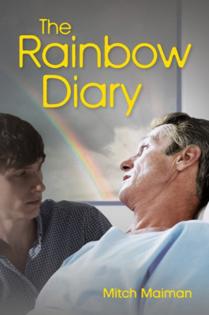Emotionally charged novel reflects on mortality, loss and redemption
Published in Mom's Advice
Maybe it’s that I’m at an age where I ponder mortality more than others. Regardless, "The Rainbow Diary," a novel by Mitch Maiman, hit an emotional nerve and had me thinking long and hard about his truly intelligent and insightful protagonist, his story and the message he delivers about one of our greatest mysteries.
Readers get a sense of what they are in for from the very first words of Kenneth Talbot: “I know, now, that I am dying. Not someday soon, or a week or two. No, I am dying right now. I know this for a fact.”
What a powerful opening. It put me in an immediate stranglehold that only tightened as the slick writing and poignant narrative continued.
They say – as if “they” know – that your entire life flashes before you at the end. Maiman’s setup lays the groundwork for the decent, caring yet vulnerable and imperfect Talbot, in his final moments, to reflect on that life – primarily the bond, often a difficult one, with his son Brian; the disappointment of a marriage gone bad (or bad from the start); a childhood with a loving mother and bullying father; and even a nurse during his treatment that he grows to love.
It’s as if the entire book is that life flashing before Talbot in a matter of seconds but detailed over 200 pages.
Maiman cleverly alternates chapters between the past and present. Brian is at his bedside, helping Talbot reconcile the most important loose thread he hopes to tie up at the end.
But as well as a chance to study the past, author Maiman provides a glimpse of his vision into Ken’s “future.”
While philosophers, scientists, and religious leaders have long offered versions of what it’s like to die, Talbot’s take covers both the visual and spiritual, characterized by colors and comfort. It is a seemingly peaceful, fearless transition, and the time devoted to it in the novel is at least as significant as the story itself. However one views death, Talbot’s words are soothing and reassuring. Maiman makes readers want to believe that his vision of this mystery is the right one.
Could it be as basic as this? “Death simulates life. It is simply a logical extension…We look for some sudden change when we die … But it isn’t that way.”
“Our bodies are simply transporters of our essence, vehicles of life rather than life itself.”
It’s funny how thoughts, and revelations, often become clearer from one’s deathbed. And Talbot acknowledges that: “They say that youth is wasted on the young; well, to some degree, I think life is wasted on the living … Dying can sure make a person overly philosophical.”
Of course, reading a book where the narrator tells you on page one that he is about to die makes me think in the back of my mind, ok, so how is this going to end? Is the narrator going to be around on the last page, or will some other character pick it up? Not to worry – no spoilers here.
"The Rainbow Diary" by Mitch Maiman had me thinking perhaps as much as any book I have read this year. There is so much to unpack, so much to ponder, so much to enjoy, and even a lot to learn, whether you want to take Maiman’s vision of death as gospel or not. His view is very calming and serene – “downright scary and awesome at the same time.” The book is as philosophical as it is story-driven, but it is so well written and so well constructed that I literally couldn’t put it down (a cliché I hope I can eliminate in my next life).
Either way, Talbot gives readers hope and inspiration to “live death to the fullest.”
As he says, “Death plays by its own rules. I guess the time has come for me to finally learn them.”







Comments